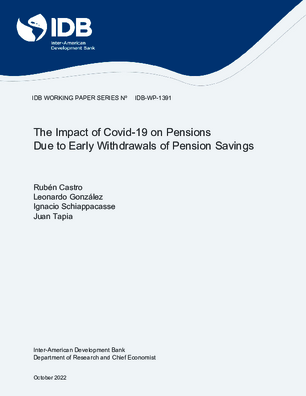The Impact of Covid-19 on Pensions due to Early Withdrawals of Pension Savings
Date
Oct 2022
The Chilean pension system was hit hard during 2020-2021 by the withdrawal of 25 per cent of the individual pensions funds accumulated by 2019, an amount equivalent to 20 per cent of Chiles GDP. We estimate here the impact of those withdrawals on new pension allowances, using a combination of official data sets and the IDB model for the actuarial projection of pensions, including its heterogeneity matrix, to simulate the distribution of pension impacts. The withdrawal impact decreases in new retirees of future years until disappearing around the year 2065. We estimate respective impacts of about 31 percent and 37 percent for males and females new self-financed pensions around the year 2022, which goes to about 56 percent among the third of the affiliates with the lowest savings. However, we found that the recent increase in non-contributory pensions more than counteracted this impact for roughly 90 percent of 2022 new retirees. Regarding labor markets shocks, we found only a moderate role for them in the long-term evolution of the pension system, as we also found to be the case of seven Caribbean countries (Cuba, Haiti, Dominican Republic, Jamaica, Trinidad and Tobago, Bahamas and Barbados). As an overall conclusion, we recommend studying contribution rates, because low-salary workers attain a substantial replacement rate with just the non-contributory pension, which casts doubt on whether a mandatory contribution is appropriate for them.




